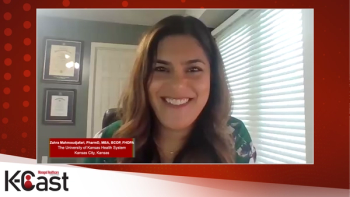
CAR-T for Lymphoma Among the Topics at NCCN Meeting
Durability and toxicities such as cytokine release syndrome and immune effector-cell neurotoxicity syndrome are among the challenges.
New data on the role of chimeric antigen receptor (CAR) T-cells in the treatment of diffuse large B-cell lymphoma were just one of the notable topics scheduled to take place at the
Prior to the mid-October meeting, Managed Healthcare Executive® spoke with Andrew D. Zelenetz, M.D., Ph.D., an oncologist at Memorial Sloan Kettering Cancer Center in New York and lead of the planning committee for the meeting.
What are some of the top developments in blood cancer research that will be presented at the meeting?
We have been holding the NCCN Hematologic Malignancies Congress for close to 20 years, and we intentionally focus on the most important areas where we’re seeing big changes. This year, those areas include management of chronic lymphocytic leukemia (CLL) — an area that changes frequently because of rapid advances—and important new data on the role of chimeric antigen receptor (CAR)-T cells in the treatment of diffuse large B-cell lymphoma.
We’re including an informative debate on the role of CAR-T cells in the management of large cell lymphoma. This is an important topic. Another is that, after years of incremental progress in acute myeloid leukemia (AML), we’re now seeing new agents that are significantly improving outcomes for AML patients, including senior patients. And, in multiple myeloma, we’ve seen an explosion of immunotherapies.
What is the role of CAR-T cell therapy in treating lymphomas?
CAR-T cell therapy has emerged as an important option for treatment of relapse/refractory diffuse large B-cell lymphoma, mantle cell lymphoma, and, most recently, follicular lymphoma.
In patients with diffuse large B-cell lymphoma, these therapies have provided potentially curative options that were not previously possible.
What are the challenges of utilizing CAR-T cell therapy to treat lymphomas?
Long-term follow-up in patients with mantle cell lymphoma has demonstrated that while this is an effective therapy, we see late relapses. Current follow-up in patients with follicular lymphoma is inadequate to determine the durability of benefit.
Nonetheless, there are clear opportunities for improving the efficacy of these treatments. There are a number of toxicities associated with CAR-T cell therapy. These include
As we have gained greater experience, we have learned to identify early signs of these toxicities and intervene before high grade toxicity develops.In addition, new agents have been identified that can help mitigate CRS.Other toxicities such as long-term B-cell suppression and extended cytopenias remain a challenge and a potential risk for late complications of treatment.
What are the new agents that are improving outcomes for AML patients?
Initial management strategies for patients with AML are influenced by physiologic age, history of prior myelodysplasia or cytotoxic therapy, performance status, and the presence or absence of actionable mutations.
Older adults with intact functional status (i.e., ECOG score 0–2), minimal comorbidity, and de novo AML without unfavorable cytogenetics or molecular markers, without antecedent hematologic disorder, and without therapy-related AML would likely benefit from intensive cytarabine-based therapy, regardless of chronologic age.
Patients who are not candidates for intensive therapy should receive low-dose cytarabine (LDAC), hypomethylating agents (HMAs), venetoclax or glasdegib combined with a HMA or LDAC, or gemtuzumab ozogamicin.Actionable mutation status in this population can also drive treatment strategies that include ivosidenib, enasidenib, or sorafenib. Consolidation therapy may include additional therapy and allogeneic hematopoietic stem cell transplant (HCT) in eligible patients if a donor is available.
Newsletter
Get the latest industry news, event updates, and more from Managed healthcare Executive.



















